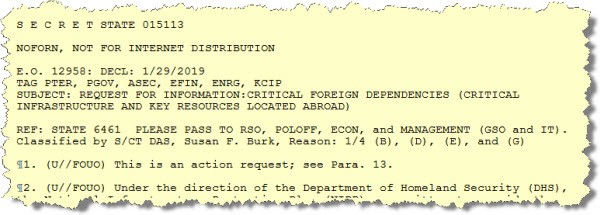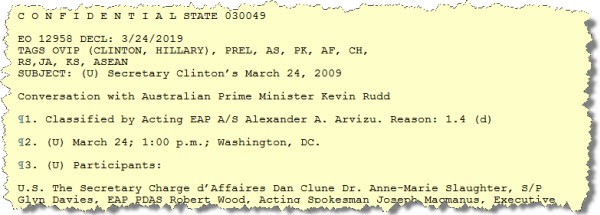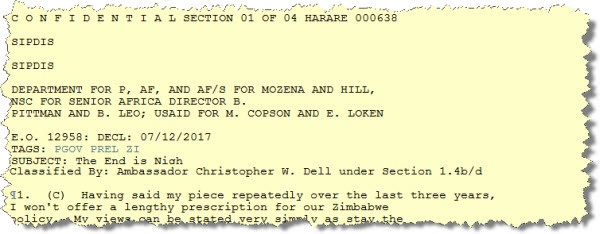As the net tightens around WikiLeaks founder Julian Assange, the revelations emanating out of the whistlebower’s latest document dump continue to fascinate. Currently, WikiLeaks has released just 931 of a total 251,287 cables sent from United States embassies around the world. With the drip feed of a quarter of a million embassy missives yet to come, we’ve barely scratched the surface on what could be revealed by this extraordinary cache of dispatches.
Today, Crikey is rolling out its ongoing coverage of all the juiciest cables — from embassy gossip to startling double-dealing diplomacy. Strap yourselves in people, there’s a long way to go on this one.
Only a limited amount of cables have been released that reveal concern Australian diplomacy directly so far. Below are three of them. Over the coming days we will be featuring more cables under different themes relating to international relations.
In the meantime, you can check back to our rolling WikiLeaks page which contains an extensive archive of Crikey‘s coverage so far, including Guy Rundle’s reportage from the UK, Bernard Keane on the fallout in Canberra, Luke Miller’s analysis in The Canberra Cables, and ongoing coverage of Julian Assange’s fight to clear his name over allegations of s-xual assault in Sweden.
In the meantime, here’s the Australian cables crunched:
CABLECODE#: 09STATE15113
2009-02-18 23:11
United States ‘critical infrastructure’ list
Key point: This global list of critical non-military assets was apparently compiled by US diplomats in secret. It lists crucial factories, pharmaceuticals, mines and telecommunications networks, which, if attacked by terrorists, would supposedly harm United States’ interests. Assets listed in Australia include resources such as nickel and magnesium, an undersea telecommunications cable and two medical companies.
Dispatch: “The overarching goal of the National Infrastructure Protection Plan (NIPP) is to build a safer, more secure, and more resilient America by enhancing protection of the nation’s critical infrastructure/key resources (CI/KR) to prevent, deter, neutralize or mitigate the effects of deliberate efforts by terrorists to destroy, incapacitate or exploit them; and to strengthen national preparedness, timely response, and rapid recovery in the event of an attack, natural disaster or other emergency.”
What they said: “There are strong and valid reasons information is classified, including critical infrastructure and key resources that are vital to the national and economic security of any country.” — US Assistant Secretary of State Philip Crowley
“The publication of the documents that we’re seeing is incredibly irresponsible and reprehensible.” — Attorney-General Robert McClelland
CABLECODE#: 09STATE30049
2009-03-28 02:02
Hillary Clinton’s conversation with Kevin Rudd
Key point: Kevin Rudd’s first mention in the Cablegate affair details a 75-minute lunch following the ex-prime minister’s meeting with US officials at the White House in 2009. In it details are revealed of a discussion between Rudd and US Secretary of State Hillary Clinton about foreign policy in Afghanistan, Pakistan, China, Russia, as well as Rudd’s Asia-Pacific community initiative. The most startling revelation was Rudd’s call for the US to be prepared to “deploy force” if China does not intergrate into the international community.
Dispatch: “Calling himself ‘a brutal realist on China,’ Rudd argued for ‘multilateral engagement with bilateral vigor’ — integrating China effectively into the international community and allowing it to demonstrate greater responsibility, all while also preparing to deploy force if everything goes wrong.”
What they said: “The business of diplomacy is not just to roll over and have your tummy tickled from time to time by the Chinese or anybody else. The business of diplomacy is to be firm about your national interests and to prosecute them accordingly, as we have done in the past, as I will be doing in the future as Foreign Minister.” — Foreign Affairs Minister Kevin Rudd
CABLECODE#: 07HARARE638
2007-07-13 10:10
Australia doesn’t ‘pack enough punch’ in diplomacy
Key point: Australia’s first mention in the Wikileaks US cables came in the form of an update about the political conditions in Zimbabwe. This cable revealed what has long been understood — that the United States considers Australia, at best, a middle power in foreign diplomacy.
Dispatch: “The EU is divided between the hard north and its soft southern underbelly. The Africans are only now beginning to find their voice. Rock solid partners like Australia don’t pack enough punch to step out front and the UN is a non-player. Thus it falls to the U.S., once again, to take the lead, to say and do the hard things and to set the agenda.”
What they said: “When I speak to my American counterparts, to Secretary of Defense, Gates, or to Secretary of State, Clinton, not only do they very genuinely appreciate the effort that we make in Afghanistan, which Australia regards as being in our national interest, helping to stare down international terrorism, but they also very much welcome the general role that we play in the international community.” — Defence Minister Stephen Smith
For more information on Wikileaks, including Guy Rundle’s take and our Canberra Cables section, head over to our Wikileaks landing page. We will be updating our coverage as more cables are released.










wouldn’t it be interesting to get any cables from the time of the Bali bombing